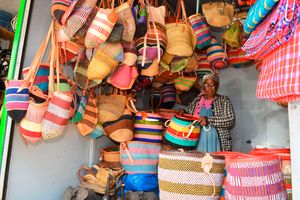
The cries of magistrates and judges being implicated in corruption and going to bed with corrupt individuals have become the norm in Kenya.
Nairobi had one of the largest gatherings of Christians at Benny Hinn prayer crusade a week ago. Looking at the turnout, which included government officials led by President William Ruto and the first lady Rachel, it won’t be a surprise if an alien thought it had landed in Heaven.
However, the reality is that, despite the show of godliness, the country has been experiencing a series of sinful events, top of which is theft of public funds by government officials. Despite the Bible’s condemnation of stealing, corruption has gone on unabated within the government. No number of prayers has been able to put this jinni back in the bottle.
The challenge the war against graft faces has, in fact, been corruption within the corridors of justice. The Prosecution and the Judiciary have been blamed for failing in their duty of holding to account those implicated in corruption, particularly the so-called ‘Big Fish’. I, therefore, wonder whether it is time we introduced a jury in all criminal cases, including financial crimes, to help judges reach a verdict. The process would, hopefully (if it won’t be tainted by corruption, that is), be able to bolster decision-making in the courts.
‘12 honest people’
The jury is usually made of 12 honest members. Paraphrasing the line in The Wire, a Baltimore-based crime drama, it may not be easy to ‘find 12 honest people’ in Kenya given the negative impact corruption has had in the country but I believe it is still worth a try to help to improve due process and end corruption.
The cries of magistrates and judges being implicated in corruption and going to bed with corrupt individuals have become the norm in Kenya. The phrase ‘Why hire a lawyer when you can buy a judge?’ speaks volumes of how criminal matters are decided in the country. The difficulty with such thinking is that it allows justice to belong only in the hands of those who can afford it and undermine the rights of the poor and vulnerable members of society.
Relying on one individual—that is, the judge—to reach a final verdict on his or her own has the potential of leading to miscarriage of justice, especially where conflict of interest is overlooked and personal considerations influencing a judge such as tribalism, class and greed.
The intention of a jury trial is to ensure that an offender has the right to be tried in front of a ‘jury of their peers’. The jury system is very important, especially for suspects facing serious crimes. Since financial crime falls under that category, it would be important to expand the scope in our courts to include a jury in the trial of individuals accused of corruption.
That will serve two purposes, hopefully. First, it will increase the chance of accused persons to get a fair hearing. Secondly, it will minimise the risk of judges being financially influenced (bribed) to make final decisions unilaterally. The Jury will form a buffer during criminal trials at the High Court. These are extra eyes and ears that will help the judges to reach a fair and bribery-free verdicts.
No doubt, the jury service will require extra funding, but it is a step in the right direction, especially in relation to trials of corrupt senior public and state officials who have been difficult to hold to account due to usurpation of roles by officials in the Prosecution and Judiciary, where such cases are interfered with prematurely with intention to collapse them.
Since it uses common law, Kenya is ripe for a jury system. The over-reliance on judges has been frustrating in bringing to book individuals accused of theft of public money. The Prosecution’s continuous attempts to undermine corruption cases has also become an issue of serious concern. It is, therefore, imperative that a new system—such as those dependent on a jury—is established to, hopefully, add another layer of protection for the accused and boost the rule of law.
Honesty and integrity
The jury system is dependent on honesty and integrity. As Chapter Six of the Constitution, on Ethics and Integrity, continues to be derailed, especially by those in government, it will be a challenge initially to run a corruption-free jury system. However, as long as the intention is there to improve our legal system, this is a hurdle that can be overcome once it starts to bear fruit. Having another system to help end corruption is long overdue and a jury system might be just what the country needs to streamline the due process of the law.
The members of the jury drawn from a cross-section of Kenyans should not be an issue. The electoral register is the face of Kenya and getting 12 members of the jury from it should be child’s play. The challenge is whether corruption will fight back and prefer to use an adversarial system that is managed by a judge alone.
Nonetheless, the jury system is food for thought, especially for the criminal justice system. It is the way to go to grow our legal system and enhance accountability.
Ms Guyo is a legal researcher. [email protected]. @kdiguyo













